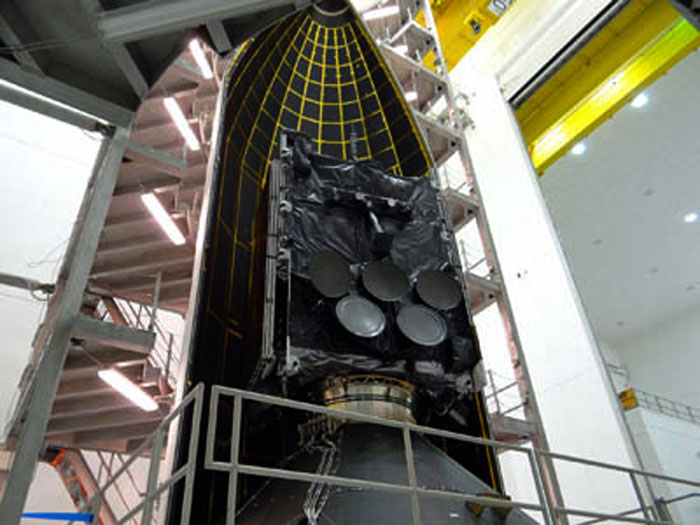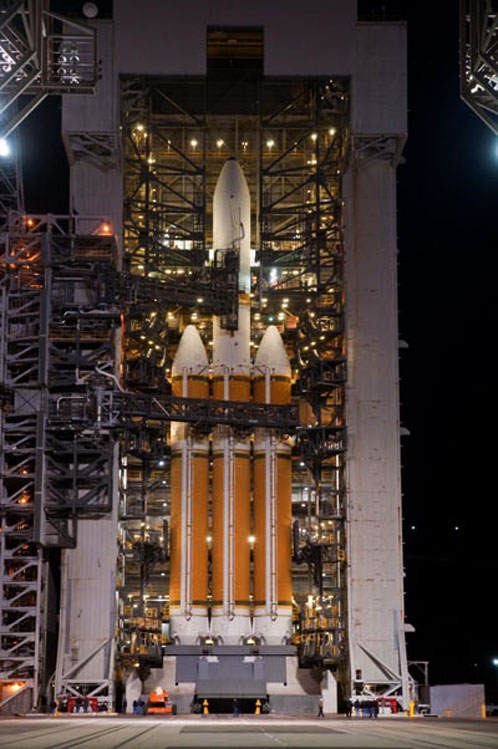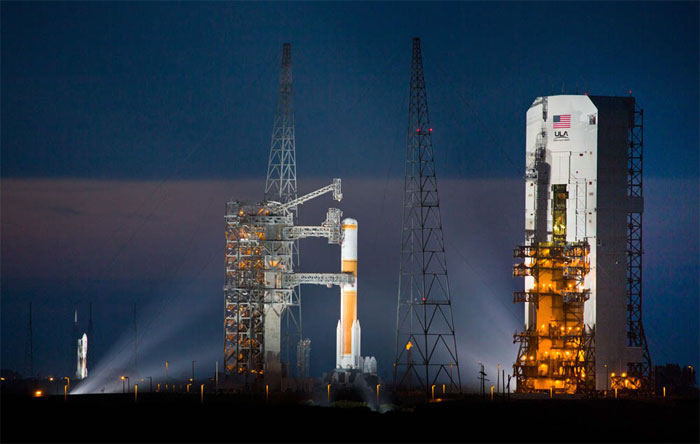.
The payloads are attached and final preparations are underway for two national security satellites heading for different orbits aboard United Launch Alliance Delta 4 rockets in August, one from Cape Canaveral, the other at Vandenberg Air Force Base in California.
.

The Air Force's sixth Wideband Global SATCOM high-capacity communications satellite was loaded aboard its Delta 4 at the Florida spaceport's Complex 37 pad last Tuesday, July 23 for blastoff Aug. 7.
The WGS 6 spacecraft, financed entirely through a partnership with Australia, will join a constellation of satellites now comprising the Defense Department's primary communications network for connectivity to forces around the world.
The Boeing-built satellite, already encapsulated in the rocket's composite nose cone, was moved from the commercial Astrotech processing facility in Titusville for mating to the launch vehicle.
The rocket will fly in the Delta 4 Medium+(5,4) configuration, which features a five-meter upper stage and payload fairing, plus four strap-on boosters for added thrust, to lift the 6.5-ton satellite into a geosynchronous transfer orbit.
The 49-minute launch window on Aug. 7 opens at 8:29 p.m. EDT (0029 GMT), shortly after sundown.
Meanwhile, workers on the West Coast are readying a massive Delta 4-Heavy rocket for blastoff from Vandenberg's Space Launch Complex 6 on Aug. 28.
.

File photo of a Delta 4-Heavy at Vandenberg. Credit: ULA
.
Liftoff will be possible between 10 a.m. and 12 noon local time (1-3 p.m. EDT; 1700-1900 GMT). The exact time will be revealed closer to launch.
That launch will deploy a classified payload for the National Reconnaissance Office, the government agency responsible for flying the country's fleet of spy satellites.
"From developing and acquiring new capabilities to launching and operating the most technically-advanced systems, the NRO remains the premier space reconnaissance organization in the world," NRO Director Betty Sapp told Congress earlier this year.
The cargo for the NROL-65 mission was transported to SLC-6 on the southern end of Vandenberg and mated to the Delta 4-Heavy last Wednesday, July 24. The craft's identity and capabilities are kept classified.
The triple-wide Heavy launcher is the most powerful rocket available in the U.S. inventory, capable of putting school bus-sized reconnaissance observatories into polar orbit.
The key Delta 4 milestones last week occurred mere days after ULA successfully launched an Atlas 5 rocket on July 19 from the Cape to deploy the U.S. Navy's MUOS 2 mobile communications satellite, the company's sixth flight of the year.
.

The Atlas 5/MUOS vehicle (left) awaits its liftoff while the Delta 4/WGS completes its countdown rehearsal on July 17. Credit: ULA
.
What's more, the Delta 4 for WGS 6 underwent a countdown dress rehearsal and fueling test while the Atlas 5 was rolling out from its assembly building to the launch pad on July 17.
"These simultaneous operations demonstrate the tremendous capabilities of the combined contractor and U.S. government teams," said Jim Sponnick, ULA vice president, Atlas and Delta Programs. "With this team's innovative and ever-present focus on delivering mission success and reliable and repeatable processes through Perfect Product Delivery, the United Launch Alliance team has achieved an unparalleled launch rate."
ULA has six more launches planned through the end of the year and 15 manifested for 2014.
"We are in the middle of a launch campaign with an operational tempo that is unprecedented since the inception of the Evolved Expendable Launch Vehicle (EELV) program more than a decade ago," said Sponnick. "This team's ability to maintain this high tempo with a one launch at-a-time focus on 100 percent mission success is a testament to the decades of experience this team brings each and every day to this exacting business."
Quelle: ULA
5467 Views
